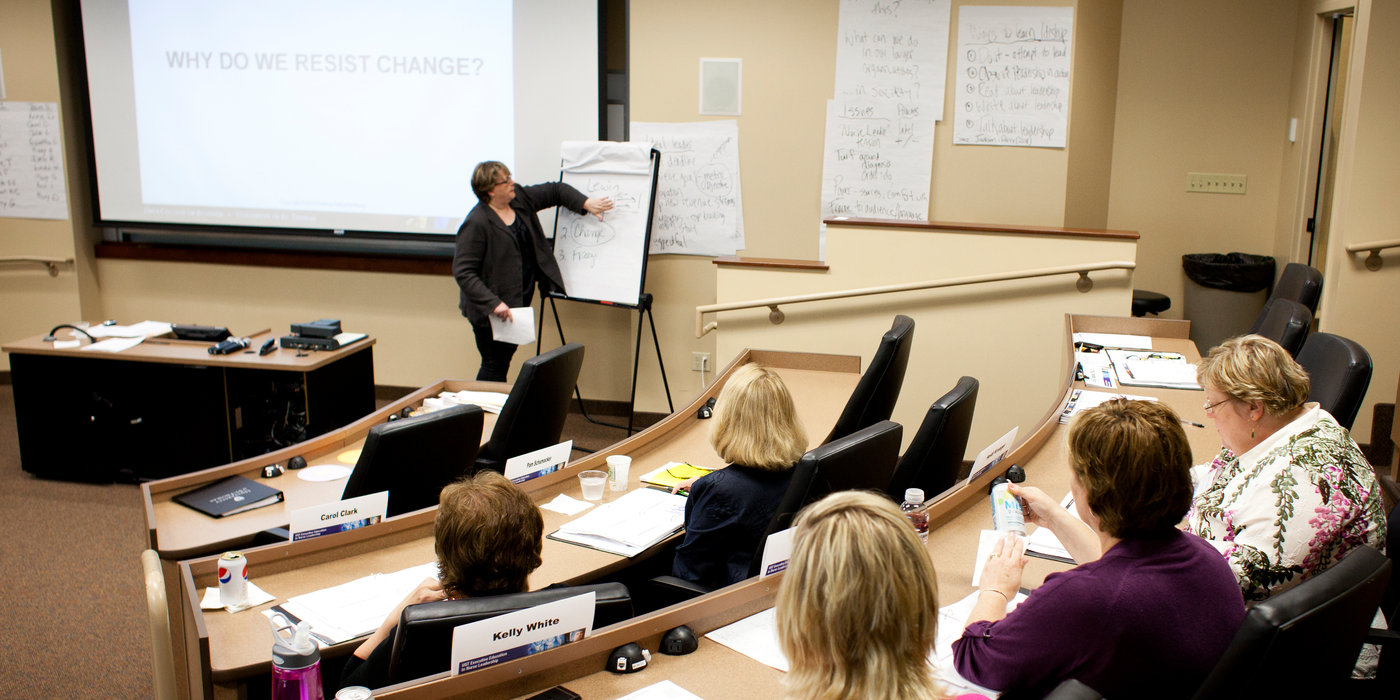Recently, we sat down with Jacque Anderson, new Assistant Dean for Executive Education to find out about what’s next for the Executive Education program at St. Thomas. Jacque started her career in finance, working at both GE and Pillsbury. In 2001, she made the jump to the executive education field, leading the Carlson School of Management's Executive Education Custom Business and then later serving as Chief Learning Officer at McGladrey.
What are the current trends in executive education?
It’s an exciting time. The field has really transformed over the last 15 years and I’m happy to say that the days of the “sage on a stage” are over. Advances in technology are impacting the entire education market, allowing for innovation in how content is delivered and experienced, whether it’s by virtual classrooms, synchronous and asynchronous online courses, social networks, wikis, simulations or discussion boards.
https://www.youtube.com/watch?v=rfFQm8jyMM8
There’s also been a significant shift in the focus of the experience. There’s a consistent emphasis on raising self-awareness of individual competencies and impact. This is accomplished through reflection journals, action learning projects, individual coaching and “peer-to-peer” coaching.
Today, executive education is really about practicing pragmatic skills and methods of leadership in a supportive environment, whether that’s virtual or in a physical classroom. They can take these skills right into the workplace and apply them to the challenges they face at work. Faculty are facilitators who provide critical models, insights and feedback. Colleagues in the learning experience are now peer mentors who enhance the experience by sharing the responsibility to provide challenges and feedback.
Who is today’s typical executive education student?
I don’t think there is a typical executive education student. It’s a program that’s open to any professional who wants to develop and master new skills. A great number of our participants enroll because they want to take on new responsibilities or address changing needs at their current job. But we also continue to see a growing number who want to develop entirely new skills and mindsets that will take them to the next level – whether that means starting their own business or heading into a new career. The role of degreed education will always be vitally important, but I believe non-degreed executive education will only continue to become more important as people consider "multiple-careering” or moving from one career into another.
How can organizations capitalize on the impact of executive education?
Executive education works on two levels – obviously it can transform an individual and how they approach their job or career but it’s also a big component in transforming entire organizations. If a number of people within an organization take on learning new skills and have a growth mindset, this has an enormous impact on an organization’s business practices, structure and culture.
This is why we offer custom programs tailored to the vision and strategy of organizations or companies – we design a custom curriculum based on the organization telling us where it wants to go. This way, the training becomes about creating a common language, finding meaning and building an environment that addresses dilemmas by finding solutions to them. These programs result in a lot of positive momentum for organizations.
Why is the University of St. Thomas Executive Education program uniquely positioned for success?
First, the University of St. Thomas is a pragmatic educational partner. A majority of our faculty have significant industry experience – many held formidable positions in the business environment, which means they’ve been in the work situations facing our participants. They’re committed to ensuring everyone leaves the experience with concrete plans for how they will incorporate what they learned into their jobs.
Second, as a private University we’re extremely agile. Dean Lenway, who took over leadership of the Opus College of Business in the fall of 2014, made innovation, with an emphasis on leveraging technology to "flip the classroom,” a top priority. In 2015, we’re upping our investment in Executive Education in order to bring in new technologies, hire additional staff and make property investments that will allow us to expand our presence in the Twin Cities.
Finally, we’re unique because we invest in program developers who work closely with faculty and organizations to ensure a meaningful learning experience that has lasting impact and achieves the outcomes. These developers focus on content that optimizes time spent in the classroom, virtual or otherwise, through the use of simulations, peer learning, coaching and technology solutions.







